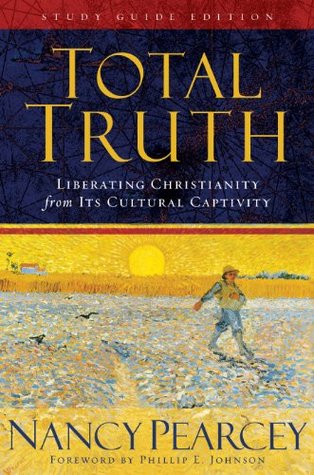Total Truth: Liberating Christianity from Its Cultural Captivity
- Approximate Time Commitment: 10 minutes
TOTAL TRUTH: Liberating Christianity from Its Cultural Captivity by Nancy Randolph Pearcey is about the worldview of Christians today and the divide in the truth. This review was written by Hank Griffith of South Suburban Evangelical Free Church in Apple Valley, Minnesota. This book is a hard read but it is good for all Christians.
Resource Description
Full Review:
Nancy Randolph Pearcey is a Christian intellectual who grew up in a Lutheran family in the Midwest, became a skeptic as a teenager, and later a believer at L’Abri in Switzerland the early 70s. Currently she’s the Director of the Francis Shaeffer Center at Houston Baptist University.
Pearcey’s writing style has been characterized by its “clarity, readability, and intellectual depth.” If you read Francis Schaeffer (Escape From Reason, The God Who Is There, True Spirituality, The Mark of the Christian, etc.) in the 60s and 70s, as I did, you will clearly recognize the imprint of Schaeffer on Pearcey. It’s obvious that she develops some of his themes and interprets cultural trends in light of them.
Biblical worldview
The author makes a strong case for a biblical worldview that is comprehensive and culturally relevant. Total Truth takes seriously the biblical mandate to live out all of life to God’s glory. As one reviewer observed, the book makes a strong case for Christians not checking “their worldviews on the way out of the church door. Christians must do more than slap a veneer of Christianity over their work, hobbies, and studies. They need to fully integrate their faith with all of life.”
Truth
Perhaps the most important theme the author traces over the last several hundred years in western civilization is how truth, rather than being total and comprehensive, has been divided into two levels: the top level being value (“socially constructed meanings”), the bottom level being fact (“publically verifiable truth”). This division is devastating because it means that religion and ethics have simply become a matter of personal preference, whereas science, math, and other such disciplines are verifiable.
This division reminds me of a well educated elderly lady with whom I became friends at New Harmony. When asked what subjects she enjoyed most in school, she replied immediately, “Science, math, and grammar because they have right and wrong answers!” She obviously did not believe that there’s absolute truth in other disciplines, i.e. literature, philosophy, and religion. In those domains it’s merely a matter of opinion. My older friend maintained a “that’s true for you” kind of attitude which is so prevalent in our post-modern world.
Back to Total Truth: Pearcey shows in some depth how this two story division has affected modern people’s thinking in many areas, for example, in the all-important question of the origin of the universe. Evolution is perceived as fact based on empirical data. Creationism, even intelligent design, has been totally relegated to the upper level. One of the writer’s strengths is that she’s not just a Christian philosopher, but well versed in science. Her treatment of how Darwinism has impacted not only biology, but many other areas of life, is helpful and insightful.
Evangelical world-view
For me one of the most interesting parts of the book was Pearcey’s history of American evangelicalism in which she explains why we evangelicals have not had a strong world-view tradition. Despite the many strengths of evangelicalism the author observes that it “did not overcome the age-old two-story division of knowledge – on the contrary, it intensified the split. The populist branch of evangelicalism contributed to the idea that religion is a private emotional experience (upper story), while the scholarly branch reinforced the idea that public knowledge must be religiously neutral and autonomous (lower story). As a result, religion was removed from the public realm and shunted into the private realm. There it might flourish, as in fact it has. But it would be carefully kept in its cage. Meanwhile, secular ideologies took advantage of the vacuum and quickly filled the public arena.”
True Spirituality and Christian Worldview
The last chapter entitled “True Spirituality and Christian Worldview” departs a bit from the philosophical and historical tone of the rest of the book. The author ends by pointing out, and rightfully so, that a Christian may have a biblical worldview that is comprehensive and well thought out, but still not be living the life of Christ. She correctly states that “we may do a great job arguing that Christianity is total truth, but others will not find our message persuasive unless we give a visible demonstration of that truth in action. Outsiders must see for themselves, in the day-to-day pattern of our lives, that we do not treat Christianity as just a private retreat, a comfort blanket, a castle of fairy-tale beliefs that makes us feel better.”
This 378 page book is significant, but frankly not an easy read. Nevertheless, if you’re a thinking Christian, I urge you to read it because it will challenge you and help you understand our culture. In addition, it will motivate you to develop your biblical worldview in face of the godless secularism pervasive in every area of life in America.
HG
Only logged in customers who have purchased this product may leave a review.



Reviews
There are no reviews yet.